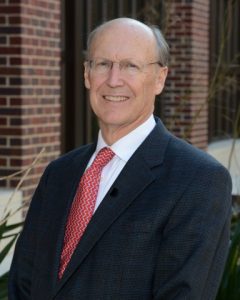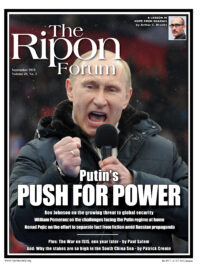(Editor’s note: this is the third in a series of essays being published this year to commemorate the 50th anniversary of THE RIPON FORUM.)

Editing THE RIPON FORUM throughout the 1980s, and being part of a team that helped rebuild the scrappy Ripon Society during that decade, will always stand out as one of the most satisfying periods of my career. Maybe the most satisfying part.
At one moment we were on trains to New York looking for donors to fund the FORUM, our papers and our conferences. At another, we were trying to build a network of big-tent Republicans on Capitol Hill and around the country. At yet another, we were trying to frame issues, develop break-through ideas and present serious scholarship.
Not that we always succeeded. When you work out of an alley on Capitol Hill for most of a decade as we did, you are not necessarily dominating the political conversation. We would have killed for a broader donor base to get out of that alley, by the way.
And, in hindsight, I wish I had appreciated more of Ronald Reagan’s core strengths: He had a vision and the determination and skill to present it. Those were special talents.
Still, we did keep the cause of a broad Republicanism alive. We were able to present a vision of a Republicanism that celebrated the rights of women, minorities and economically disadvantaged Americans while also championing open markets, global commerce and limited government.
We were able to present a vision of a Republicanism that celebrated the rights of women, minorities and economically disadvantaged Americans while also championing open markets, global commerce and limited government.
Jim Leach, Bill Clinger, Bill Frenzel, Howard Baker, Bob Dole, Nancy Kassebaum, Mark Hatfield, John Danforth and Olympia Snowe were part of the network of 35-odd legislators that formed our Congressional Advisory Board. Ripon staffers and colleagues like Rick Kessler, Greg Knopp, Ken Ruberg, Jayne Hart, Dulce Zahniser, Steve Messinger and I drew support from them. Some of those same leaders contributed to the 25th anniversary edition of this magazine in 1988.
By the time George H.W. Bush became president, urging a kinder, gentler nation, Ripon was strong enough to help define such an America. Jim Pinkerton of the Bush White House joined us for a panel discussion at Howard University about ways to create an inclusive, thriving America. Speakers like Tom Kean, Shirley Temple Black and Jack Kemp took on the same issues at Ripon dinners. And the pages of the RIPON FORUM engaged a diverse range of thinkers and leaders, including Presidents Bush and Ford, Newt Gingrich, George Will, T. Boone Pickens and Eric Sevareid.
Part of our mission was to sustain a dialogue across various parts of the GOP and beyond. We also used our platform to look at nuts-and-bolt issues that affect Americans’ lives, like health care, roads and bridges, and local schools. One way we took on those topics was through our 1988 book: A Newer World.
Part of our mission was to sustain a dialogue across various parts of the GOP and beyond.
The 1980s also were when we held conferences with fellow center-right groups across Europe. Sessions in Oxford, Cambridge, Paris, Brussels and Berlin were naturally fun and stimulating. More important, they created longstanding relationships with conservative parties in Britain, France and Germany. And trips to Prague and Budapest shortly after the Iron Curtain fell quickened our understanding of the menacing nature of communism and the deep desire for freedom that resided behind that curtain.
I headed back to Texas to join the Dallas Morning News’ editorial board in 1991. But I returned home with a trove of memories and an appreciation for the opportunities the last decade created. We no longer had to worry about having enough money to buy enough wine and cheese for a small Philly fundraiser. (True story) Still, more work was left.
That is the way spirited organizations like Ripon should always be. You hand off to a new brigade the chance to apply your values to a different period. In Ripon’s case, the values are those of a humane conservatism. I am grateful for them and for the part of Ripon’s history that my colleagues and I were able to occupy.
William McKenzie served as editor of THE RIPON FORUM from 1981-1991 and as executive director of the Ripon Society from 1987-1991. After 22 years at The Dallas Morning News, where he and two colleagues shared a Pulitzer Prize, he joined the George W. Bush Institute as editorial director in 2014.




